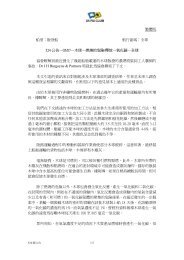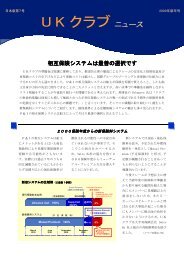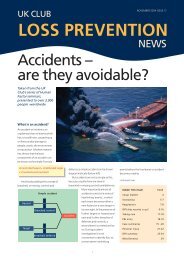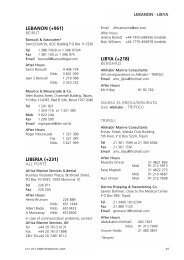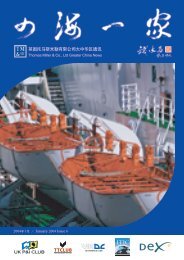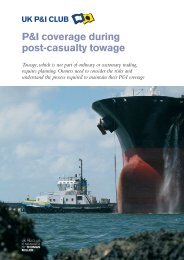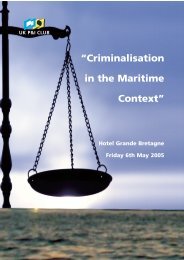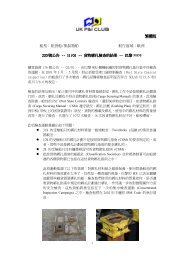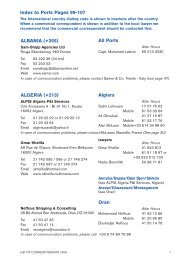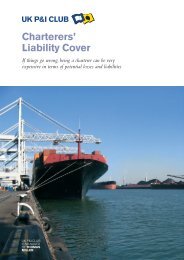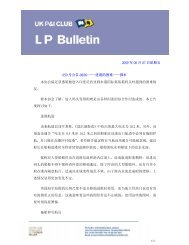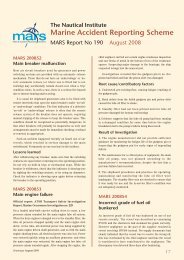Port State Control A/W - UK P&I Members Area
Port State Control A/W - UK P&I Members Area
Port State Control A/W - UK P&I Members Area
- No tags were found...
Create successful ePaper yourself
Turn your PDF publications into a flip-book with our unique Google optimized e-Paper software.
PORT STATE CONTROLINTRODUCTIONWHAT IS PORT STATE CONTROL?<strong>Port</strong> <strong>State</strong> <strong>Control</strong> (PSC) is a method of checking the successfulenforcement of the provisions of various internationalconventions covering safety, working conditions and pollutionprevention on merchant ships. Under international law theshipowner has prime responsibility for ensuring compliance,with much of the work involved being carried out by the statewhose flag the ship flies. However, not all flag states are ableto check their ships on a continuous basis when they are awayfrom their own ports, so PSC provides a back-up for monitoringthe implementation of international and domestic shippingregulations. Whilst <strong>Port</strong> <strong>State</strong> <strong>Control</strong> as a concept is not new,the increasing number of inspections and the coordination andexchange of data generated from them is a significantdevelopment, as is the stated intention of governments andmaritime authorities who see it as an effective means ofmonitoring and implementing international conventions.ORIGINSIt is the owner who is ultimately responsible for all compliancewith international and national obligations but it is incumbentupon any state which allows the registration of ships underits flag effectively to exercise jurisdiction and control inadministrative, technical and social matters. A flag state isrequired to take such measures as are necessary to ensuresafety at sea with regard to construction, maintenance andseaworthiness, manning, labour conditions, crew, training andof these developments are as much matters of perception asof reality, but insofar as their impact on the viability of theinternational maritime regime is appreciable, the effect ofthese perceptions should not be underestimated. They are:INTERNATIONAL CONVENTIONSWhile there is a growing web of international regulations,its development is dependent upon consensus andagreement. Consequently, it has sometimes been necessaryto proceed at the pace of the slowest, which leads to delayin implementation. However, it is acknowledged that IMOhas achieved impressive and much speedier results inrecent years.THE FLAG STATESSome flag states are seen as not fulfilling their function ofensuring that the owner complies with his obligations. Inparticular, the growth of registers which have no capabilityand even less intention of monitoring compliance has led toconsiderable criticism.THE CLASSIFICATION SOCIETIESThe work of the classification societies has been seen as tooeasily undermined, although in recent years IACS have donemuch to improve both perception and reality in this area.All of this has led to the burgeoning development in <strong>Port</strong><strong>State</strong> <strong>Control</strong>, not as an alternative to “Flag <strong>State</strong> <strong>Control</strong>” butas an additional means of compelling owners to comply withinternational regulations.prevention of collisions of ships flying its flag.Specifically, ART 94 of UNCLOS (United NationsConvention on the Law of the Sea) imposes a duty upon flagstates to take any steps which may be necessary to securecompliance with generally accepted international regulations,procedures and practices. This obligation is repeated at Article27 in relation to oil pollution. This is achieved in the mainby the flag state issuing safety certificates often via theclassification societies indicating compliance with the principalinternational conventions. It is these certificates, together withrelated manning, crew and environmental requirements, whichform the basis of <strong>Port</strong> <strong>State</strong> <strong>Control</strong>.Historically one of a ship’s most important attributes is theflag which it flies and trades under, but recent developmentshave highlighted the weaknesses inherent in this system. SomeREGIONAL DEVELOPMENT OF PORT STATE CONTROL<strong>Port</strong> <strong>State</strong> <strong>Control</strong> as a concept is developing worldwide as ameans of dealing with the problem of substandard shipping.However, it is important that its development is not viewed inisolation, as it remains one of a series of positive steps whichare being taken to ensure that the shipowner trades his shipsin a safe and environmentally responsible manner.The first regional <strong>Port</strong> <strong>State</strong> <strong>Control</strong> agreement, coveringEurope and the North Atlantic, was signed in 1982 and isknown as the Paris Memorandum of Understanding (ParisMOU). The Latin American Agreement (Acuerdo de Viña delMar) was signed in 1992; the Asia Pacific Memorandum ofUnderstanding (Tokyo MOU) was signed in 1993.2



